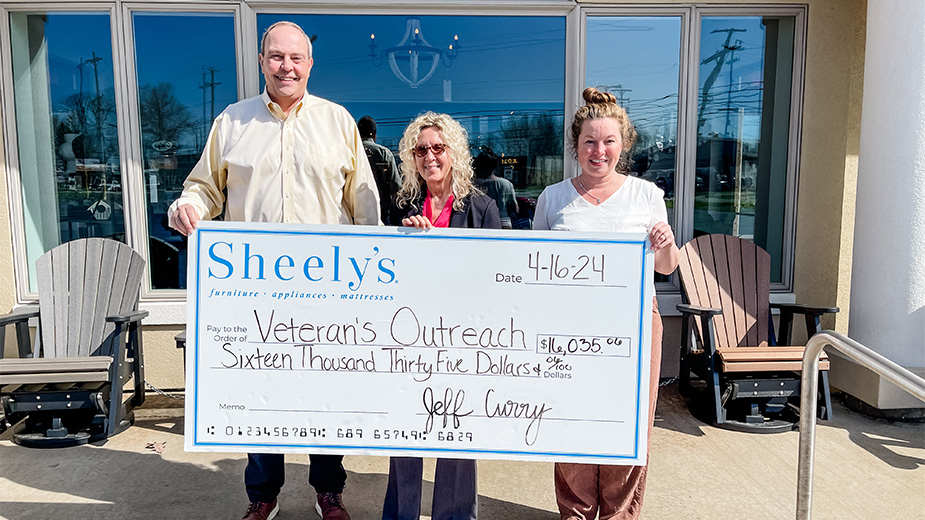Valley Lawyers Reflect on Memorable Cases
YOUNGSTOWN, Ohio – Attorneys who practice in a wide range of legal fields – patent and copyright, criminal, probate and estate, and labor and employment law – all agree that their profession rarely packs in the courtroom drama of an episode of “Law & Order.”
Still, there are those moments that surprise even the most seasoned lawyers. A homely woman who dies with an estate worth millions of dollars that no one knew about, a disruptive client who transforms an otherwise routine criminal trial into pure theater, a small company that takes on the giant telecom industry, or a labor dispute turned explosive – all are stories that have crossed the desks of attorneys in the Mahoning Valley.
Robert Herberger of Roth, Blair, Roberts, Strasfeld & Lodge; J. Gerald Ingram of the Ingram Law Office; Tracie Schmidt of Friedman & Rummell; and Patrick Wilson of Harrington, Hoppe & Mitchell agreed to speak to The Business Journal and share some of these experiences. (Note: specific names of companies or persons in some cases were not divulged because of their respect for attorney-client privilege.)
J. Gerald Ingram – Ingram Law Office
In his nearly 40 years of practicing law in the Mahoning Valley, there’s little J. Gerald Ingram hasn’t seen.
He’s spent his career as a defense attorney involved in some of the highest profile criminal cases in recent Mahoning Valley history. Several were intense, emotional and involved murder, armed robbery or drug trafficking. Then, there are the routine cases – OVIs and misdemeanors, for example – that dominate night court three times a week but are no less important to his clients and his practice.
“I’m in night court an average of two nights a week,” Ingram says, as he rocks back in his chair inside his law office at 7330 Market St. in Boardman. “I don’t keep a scorecard. But I’ve had my share of ‘not guilty’ verdicts and my share of ‘guilty,’ ” he says.
Among the more high-profile cases was defending the notorious Willie “Flip” Williams, convicted in 1991 on four counts of aggravated murder. During the trial, Williams escaped from the Mahoning County jail and broke into the Juvenile Justice Center with the alleged intent of killing potential witnesses in his case.
“He had taken hostages, and I volunteered to go down there and aided in the negotiations that led to his surrender,” Ingram recalls. “It’s my professional judgment that had he not escaped and broken into the Juvenile Justice Center. I believe he would’ve been found not guilty in under 30 minutes,” Ingram says. “The state had a horrible case.”
A jury convicted him in 1991 and sentenced him to death. He was executed by lethal injection in October 2005 at the Southern Ohio Correctional Facility in Lucasville.
Another case involved defending James Lee Hall, who along with others forced themselves into the home of a small-business owner who lived in Boardman with the intent of robbing him. “Then, the shooting started and the eldest son was shot and died in his mother’s arms,” Ingram says. “Cross examining that mother was, professionally, the toughest task I have ever undertaken.”
Ingram, along with R. Scott Kirchbaum, now a judge in the Mahoning County Court of Common Pleas, defended Hall. Although Hall was convicted, Ingram says their defense helped him avoid the death penalty.
Ask Ingram about his most memorable case, and he immediately turns to his defense of the late Bobby Zelinka, a Struthers man indicted for conspiracy to distribute cocaine. The trial stands out because it was “laced with episodic bad behavior by my client,” Ingram says.
It didn’t start well. When Zelinka was arrested and taken to FBI offices, “He slammed down on the counter a 90% pure gram of cocaine and then says, ‘C’mon guys, let me do one last line for the road,’ ” Ingram relates.
In the pre-trial phase, Ingram was busy conducting voir dire – interviewing potential jurors – and in the midst of thanking and excusing one when he heard someone snoring directly behind him.
“I look over and there’s Mr. Zelinka with his shoes off, his shirt hiked to his chest with hundreds of pounds of blubber hanging out,” Ingram says. The attorney rolled his chair to the defense table and elbowed Zelinka to arouse him. “I returned to what I was doing, and then all hell breaks loose.”
Ingram turned to see Zelinka – his shoes still off and belly exposed – standing up and pointing directly at him. “He screams, ‘M—-rf—-r! If you ever wake me up again, you’re fired!’ This was in front of the judge, the jury, God and all the world to hear,” he says in the middle of laughing. “He slept through two or three weeks of his trial, and then asked me if he could still get his plea bargain. I said I doubt it.”
In the end, it took the jury 15 minutes to return a guilty verdict. “I told him afterwards that I considered it a moral victory,” Ingram says, “because it should’ve taken just five minutes.”
Still, Ingram’s defense was skillful enough to convince the judge that Zelinka serve his sentence concurrently with time he was already doing for a burglary conviction in western Pennsylvania.
“In my opinion, a reasonably efficient prosecuting attorney’s office should have a conviction rate north of 80% because they choose what to try,” Ingram adds. “Prosecutors shouldn’t be trying cases they don’t think they can win.” This alone puts the defense attorney at a disadvantage.
Ingram, known for his colorful, heartfelt arguments and at times unkempt appearance, recalls one case where he was defending a client accused of burglary. During testimony, the victim described the perpetrator as “dirty, disheveled, with oily hair and wearing rumpled and wrinkled clothes,” as Ingram remembers.
When asked to identify the alleged burglar in court, the victim pointed. “He looks over and identifies me,” Ingram chuckles. “The prosecutor replied, ‘Obviously, that doesn’t speak well for Mr. Ingram.’ ”
The charges were dismissed.
Robert Herberger – Roth, Blair, Roberts, Strasfeld & Lodge LPA
At this moment, you can bet that someone, somewhere is conjuring up the next idea for a new product, design or invention that he believes will turn into millions of dollars.
That is, of course, provided someone else hasn’t beaten him to it.
As an attorney whose practice is devoted to patent, copyright and trademark law, Robert Herberger says considerable time is spent on determining whether these ideas are valid and whether the client has a legitimate claim to a patent.
In litigation, the invention described in a patent and the validity of the patent usually constitute 80% of any dispute. “The first issue is whether the patent is valid. If someone came up with the invention before you did or if the invention is obvious based on what is already invented, the idea isn’t new and the patent is not valid,” Herberger says. “An invalid patent can never be infringed.”
The number of patent cases in litigation has declined over the last three years because the U.S. Patent Office adopted new rules that essentially re-examine patents internally after the patent is issued, Herberger says. “When a patent is awarded, it’s only presumed to be valid. So, if you get sued for patent infringement, the first question for the court is whether the patent is valid, before you even get to whether there’s infringement.”
He recalls a case from several years ago in which he was involved. It came before the U.S. District Court for the Northern District of Ohio and involved large telecom companies – Herberger was a member of the legal team who represented one of them – for an invention these telecoms used that the government later mandated.
It used satellite systems to pinpoint the position of a cell phone user, Herberger says. Before then, companies found the caller by using cellular towers, which often resulted in erroneous locations because of hills and valleys in the immediate area that disrupted the signal.
Therefore, the phone automatically switched to the tower with the strongest signal, even though the tower was farther away and outside the caller’s billing territory.
As result, Herberger says billing problems occurred more often for customers along the Ohio River. Reception automatically switched to a tower across the river in West Virginia when a hill blocked the nearer tower in Ohio.
It turned out that a small company in this region claimed it had invented and patented the method used today where satellite technology identifies a person’s location, Herberger says, and it sued. With this invention, locating a cell phone involved signals three satellites sent to Earth to determine the caller’s position, a method known as triangulation.
“This was an important case,” the attorney says. “The natural offshoot of the invention was its use in emergency services such as 911.” By using this new method, a caller’s location could be narrowed to within a few feet where before the difference could be miles.
The case was eventually settled, Herberger notes.
Patrick Wilson – Harrington, Hoppe & Mitchell Ltd.
It was during the late summer and early autumn of 1995 when Patrick Wilson, an attorney whose practice is limited to labor and employment law at Harrington, Hoppe & Mitchell’s Warren office, experienced firsthand how passionate – and at times unruly – workers can react when their jobs and livelihoods are on the line.
“During the 1990s, we were hired by WCI Steel when they were negotiating a new contract,” Wilson says. “Negotiations were underway and then they hit an impasse.”
The company had expressed its desire to keep the mill running in case of strike, and that meant bringing in replacement workers to operate the machinery and continue production, Wilson recalls. When negotiations stalled, the 1,600 members of Local 1375 of the United Steelworkers walked out. WCI responded by bringing in temporary workers from outside the state, angering the strikers.
“That’s when things got ugly,” he says.
Harrington Hoppe was hired to help with local issues, such as unemployment claims, and there were 1,600 people who filed, Wilson says. Since the number was so large, the state of Ohio held a hearing on the matter at Packard Music Hall. “The bottom floor was packed, and there were guys trying to trip me as I walked down the aisle,” he recalls. “This was a big deal for their side as well.”
Meantime, pickets were installed outside of the plant entrances along Pine Avenue and striking workers were blocking delivery trucks from moving through the gates, Wilson says. “We asked the local courts for a temporary restraining order – limiting the pickets to just five people, and Judge [Andrew] Logan gave it to us.”
Then, in mid-September, Wilson, along with other attorneys from across the country that WCI retained, met with management inside the company’s offices. “It’s about 9 p.m. and we line up our cars ready to leave,” he says. “They knew who we were, and as we left, we were bombarded with rocks, nails, bats. We had to move slow because there were so many people on the street that evening,” he says. “Once we got to Pine Avenue, we stepped on it and made sure we weren’t followed.”
There was some talk of calling then Gov. George Voinovich’s office and requesting deployment of the National Guard, but the scene had quieted down by the next day.
“There was about $2,500 worth of damage to my car,” Wilson says, “and I reported it.”
Judge Logan explained that he sympathized with Wilson and the damage done to his vehicle, but also reminded him about how passionate the Mahoning Valley is when it comes to labor issues.
“It really opened my eyes,” Wilson says. “And, I think it caught the company’s attention, too, and was one of the factors that brought them back to the table.” A new contract was reached and replacement workers were in the plant about a month.
Seven years later, WCI, under the ownership of Ira Rennert and Renco Corp., filed for bankruptcy and was subsequently acquired by Russian steel maker Severstal SA. That company sold it back to Rennert-owned RG Steel in 2011.
A year later, the plant filed for Chapter 11 for the last time and was purchased by BDM Holdings. BDM failed to find a buyer for the operations, more than 1,000 workers lost their jobs, and the plant was demolished and its equipment auctioned off.
“It’s just shocking now to drive by,” Wilson reflects. “It’s an empty field today.”
Tracie Schmidt – Friedman & Rummell Co.
For every probate and estate case that is heartbreaking because of the death of a loved one, there is often another that ends with a pleasant outcome and the occasional surprise.
That’s the trend that Tracie Schmidt, a probate and estate-planning attorney at Friedman & Rummell Co., Canfield, has experienced since she joined the firm full- time in 2007.
“For every sad story, you have those that are kind of nice and stories that are great,” she says.
These are the cases that Schmidt says make her area of law interesting and heartening. Often, probate and estate cases devolve into feuds that eventually lead to irreparable divisions among family members. However, there are those cases where the deceased has quietly left a legacy for their children or community to enjoy and prosper.
“There are really a lot of those,” Schmidt says. “There are people who have lived their whole lives in modest circumstances, and no one in their family ever knew.”
She recently handled a case where a man who lived on a sizeable plot of land – but nothing out of the ordinary – died. “You would think he was just a small farmer, hardworking, lived modestly, but he planned and managed his finances well,” she says. In the end, the man left a charitable foundation.
Even if there are three or four such cases a year, Schmidt says, they reflect well on how people care about this community and its future.
And, there are cases that come across her desk that affect others who least expect it. One case Schmidt is working on involves a woman, with no spouse or children, who lived humbly her entire life. Only when she died was it discovered that she had saved millions of dollars.
This leaves Schmidt with the task of tracking down distant heirs, some of whom have lived out of town for decades. “It’s interesting to talk to family members who never realized this, and how genuinely surprised they are,” she says. “It’s kind of neat.”
Copyright 2024 The Business Journal, Youngstown, Ohio.



